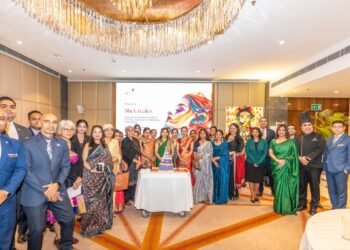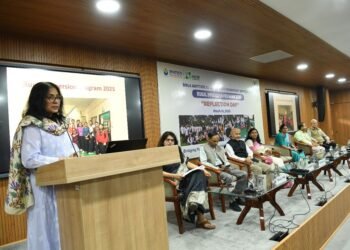Anti-leprosy Day and World Neglected Tropical Diseases Day on January 30
Leprosy, lymphatic filariasis, kala azar, schistosomiasis, trachoma, and trichuriasis are examples of neglected tropical diseases- a diverse group of communicable diseases that prevail in tropical and subtropical conditions in 149 countries.
Incidence of NTDs occurs in places with unsafe water, poor sanitation and limited access to basic health care. Since the very poor and marginalised population contracts these diseases, there is no discourse around them.
Cross disability rights organisation NCPEDP hosted a seminar in collaboration with TLMTI on issues surrounding leprosy – a Neglected Tropical Disease.
To commemorate Anti-leprosy Day and World Neglected Tropical Diseases Day on January 30, some of India’s most influential advocacy groups held an informative seminar titled ‘Future Forward 2020: Building Momentum for Inclusion and Elimination’ at the Constitution Club of India, New Delhi, with an aim to highlight the existing burden, barriers and required policy interventions for the elimination of leprosy and the endemic of Neglected Tropical Diseases in India.
Speakers included Dr Niraj Dhingra, director of Government of India’s National Vector-Borne Disease Control Programme, Dr Dhruv Pandey, World Health Organization, and sector leaders such as Arman Ali, executive director, National Centre for Promotion of Employment for Disabled People (NCPEDP), and persons affected by leprosy.
Leprosy is one of the 20 diseases formally recognised as Neglected Tropical Diseases (NTDs).As per World Health Organisation (WHO), NTDs are a diverse group of communicable diseases that prevail in tropical and subtropical conditions in 149 countries that affect more than one billion people and cost developing economies billions of dollars every year.
“In line with the commitment to highlight the burden of NTDs and raise public discourse on the issue, NTD partners in India – Global Health Strategies (GHS), The Leprosy Mission Trust India (TLMTI) and National Centre for Promotion of Employment for Disabled People (NCPEDP) will adopt an integrated approach and support each other in undertaking several activities to galvanize visibility on the issue,” said Arman Ali, executive director, NCPEDP.
NCPEDP is India’s apex cross-disability rights organisation that works towards better policy, employment and the rights of persons with disabilities.
Dr Dhruv Pandey, National Professional Officer for Kala Azar (black fever), WHO said, “NTDs get little global attention as mostly poor get afflicted by the disease. Their voices are not heard. We should bring the focus in the disease irrespective of the fact that poor people are getting affected.”
WHO data shows that 58% of the newly diagnosed leprosy cases in the world in 2018 were in India. This despite the fact that India officially eliminated leprosy in 2005, reducing its prevalence rate to 0.72 per 10,000 people at the national level. However, as reported by the National Leprosy Eradication Programme of the Ministry of Health & Family Welfare, in 2017-18, a total of 1,26,164 cases of leprosy were detected in India.
Disability activists believe that despite being one of the seven disabilities covered under the ’95 act, persons affected by leprosy are marginalised even within the disability sector.
“There are still many myths and misconceptions around leprosy which act as barriers preventing people from identifying the disease, taking treatment and more importantly accepting those affected by leprosy as any other. Fear of stigma further deters people from seeking healthcare when they may be affected by leprosy, adding to the risk of disability and ongoing medical issues” added Arman.
Dr Neeraj Dhingra, Director, NVBDCP (Govt of India)& DDG Leprosy said that capacity building of health workers is the key to eradication of disease. “Elimination starts with mind-set change. We need to address issues related to elimination holistically,” said Dhingra.
In 2019, Union Health Minister Harsh Vardhan had written to Union Minister of Law and Justice Ravi Shankar Prasad and Union Minister of Social Justice and Empowerment Thaawarchand Gehlot, seeking an amendment to existing discriminatory laws against persons affected by leprosy.
Even though the disease is now fully curable, it is disturbing to learn that there still exist 108 discriminatory laws against persons affected by leprosy, including three Union and 105 state laws,” the minister was quoted as saying.
TLMTI, along with NCPEDP and Vidhi Centre for Legal Policy, is working with the Government of India and state governments for repealing these discriminatory laws.
Dr Mary Verghese, Executive Director of TLMTI said, “In my work with people affected by leprosy, I meet numerous people every day, who by sheer grit and courage have overcome the challenges of leprosy and live dignified lives in their communities. Their stories reiterate the fact that leprosy is not a limiting factor for realising dreams.”
Dhvani Mehta, Vidhi Centre for Legal Policy said that it is the role of the civil society to advocate for the passage and implementation of law. Dr Indira Behara, Tankha of Global Health Strategies stressed on creating messages that are a lot more sensitive towards women.





















